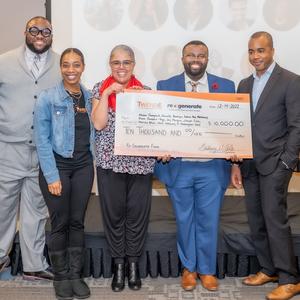
Business investor Garrison Snell had spotted a promising target for an acquisition. But he did not understand what he was buying.
"Do you know what metal stamping is? I didn't either," Snell said in an interview. He detailed what he learned: a coil of steel feeds into an immense machine that slams down onto the metal, using dozens to hundreds of tons of pressure to form it into a part.
Snell sealed that purchase and hasn't stopped there. Now he owns three manufacturing companies in Tennessee and South Carolina, employing a total of 110 people. He has signed a letter of intent to buy a fourth.
Snell is 28 years old, barely one-third the average age of his portfolio of small businesses, one of which survived the Great Depression.
The $13 million of acquisitions are Snell's response to a situation most entrepreneurs eventually face: what to do after they sell their startups. Snell faced that prospect earlier than most, in his mid-20s. And he's answering the question in a way he never anticipated — buying family-owned manufacturing companies that lacked an in-house successor to the CEO role.
"These businesses represent a whole lot of the real economy, a lot of local impact, and they’re good businesses. There's nothing wrong with the business, it's just that they've done no succession planning," Snell said. "The whole reason we want to buy it is to preserve it for the next generation, future-proof it with new technology and processes, so that these jobs remain, and provide income for the families of those people."
Snell had no experience in manufacturing, though he had a little familiarity with it: His father ran a machine shop in Arkansas. Snell earned a music business degree in 2015 from Belmont University and started two marketing companies. Three years later, a New York-based investor bought one of them, named Gyrosity, and acquired a stake in the other, Crosshair Music.
The deal was valued at more than $1 million. That, plus additional "earn-out" payments to Snell in the years following the sale as well as commissions from selling two song catalogs, brought him to a crossroads.
"My wife and I come from Christian backgrounds. Our thought was, 'We've sold this business, we have capital available. Besides just not working for the next 20 years, let's try to do something good.' "
He opened a family office, named Snell Ventures. He saw opportunity in what he called "one of the largest transfers of privately held businesses in our country's history," as more Baby Boomers retire without family members interested in the business. The enduring global supply chain woes have spurred more companies to seek the kind of U.S. manufacturing to which Snell had gravitated.
"Finding and acquiring the best ones is a great economic opportunity," Snell said. More than that, he said he was motivated by a desire to sustain the impact of these businesses in their local communities: Portland, Tennessee; Bradford, Tennessee; and Swansea, South Carolina.
"They help pay for employees' emergency medical bills, donate to the local schools, sponsor local soccer teams, give their employees' kids their first jobs," Snell said. "Without preserving the business itself, that impact will be lost. We believe continuing and growing that local impact, powered by the profits of the local business, is one of the most overlooked opportunities for ministry."
It might seem like charity or a rescue mission, but these companies aren't in need of a financial turnaround. Each averages $5 million to $15 million of annual revenue and they are profitable, Snell said. He combs through at least the last five years of bank statements, transactions and other company records before committing to a purchase — as well as files from at least one recession, if not two.
"It has to be better than a 6% [return on investment] every year. As long as it beats a 6% return, it's at least the equivalent of putting that into the S&P 500," Snell said.
At his current buying pace, Snell expects to have about 10 companies within five years, representing total revenue between $100 million to $150 million.
This year, Snell hired Charles Banker to grow Snell Manufacturing. Banker, whose manufacturing career spans more than two decades, relocated to the Nashville area from Chicago.
"If I say 'let's preserve these businesses,' I'd rather those businesses not pay for my mistakes," Snell said.
When Snell meets the owners of a company, he has a few tactics to counter initial skepticism stemming from his age. He's done his research ahead of time and knows their terminology. Often, there are conversations around faith and values.
"In manufacturing, there's an excitement to accept a young guy who cares about what they do," Snell said. "Most of these folks shy away from a private-equity relationship because those usually have a three- to five-year turnaround [time]. I have zero interest in selling any of these businesses, ever."






